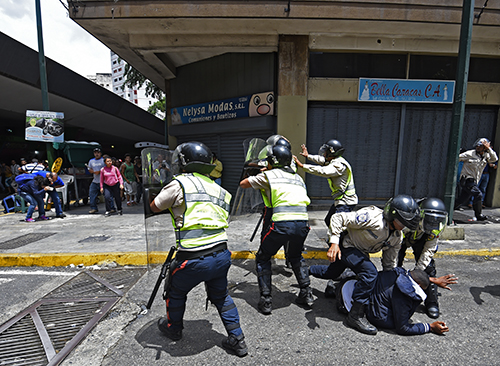New York, June 3, 2016–Several journalists were attacked and some had equipment stolen while covering protests in Caracas Thursday, according to news outlets and a local freedom of expression group. Some of the journalists who were attacked said that the Venezuelan National Guard did not intervene to prevent the attacks and in one case, forced a journalist to delete footage, according to reports.
The journalists were covering a protest in the center of the capital, which started after a supply truck was apparently diverted by the National Guard to a local supply committee, according to El Nacional. About 200 protesters blocked a central street shouting, “We’re hungry,” according to press reports. Venezuela is in severe economic crisis and many citizens wait in line for hours for scarce goods, according to reports. A presidential decree issued last month gave the armed forces and supply and production committees the authority to distribute food.
“The Committee to Protect Journalists condemns the violence against journalists in Venezuela and calls for a thorough investigation so that those responsible can be brought to justice,” said Carlos Lauría, CPJ’s senior program coordinator for the Americas. “Venezuelan authorities must ensure the right of journalists to report freely on protests without fear of violence.”
According to the Venezuelan freedom of expression organization Espacio Público, 19 journalists were attacked during the protest, and at least seven had equipment stolen. Journalists from El Universal and the video news website VivoPlay were among those attacked, the organization reported. CPJ was not able to independently verify all 19 cases. Espacio Público reported that armed civilians took equipment from the journalists. Members of the National Guard also harassed journalists, confiscating one reporter’s identity card, and forcing a journalist from the international channel NTN24 to delete footage, according to reports. Calls by CPJ to the National Guard for comment were not immediately answered.
Three photographers and a reporter from El Universal were injured and had equipment stolen during the protest, the Venezuelan daily reported. Four armed men approached photographer Pablo Pupo, hit him on the face and back and stole his equipment and personal belongings. Two other photographers, Adolfo Acosta and Luis Morillo, were also beaten and journalist Deivis Ramírez had his phone stolen, the paper reported, without providing further detail of the attacks. El Universal said that that its journalists filed a complaint with authorities Thursday and that the Public Ministry announced it had designated a prosecutor to investigate the attacks.
In another case, also documented by local media, armed men forced Andrea Cedeño from VivoPlay, her cameraman, and their driver to the ground at gunpoint. The men threatened the news team and robbed them, reports said. In a VivoPlay segment of the attack, footage shows two members of the Venezuelan National Guard drive by on a motorcycle within a few feet of the attack without intervening.
Espacio Público also reported that armed civilians attacked Francisco Bruzco, a reporter from the newspaper Diario 2001, and broke his camera. A video published by the organization shows Bruzco fleeing and another journalist being restrained by members of the National Guard while a civilian tries to steal his camera.
Carlos Correa, the director of Espacio Público, blamed armed civilians for the violence, but said that state security forces were complicit. He told CPJ: “The aggression against journalists has to do with making sure that they don’t show the actions of security forces in this context of food distribution.”
CPJ research shows that under Venezuelan President Nicolás Maduro, press freedom has deteriorated and independent journalists are restricted in their reporting. Journalists covering protests in Venezuela have faced violence and detentions in recent years.
